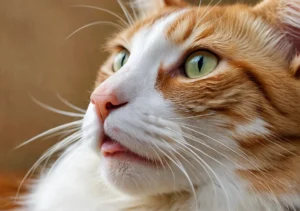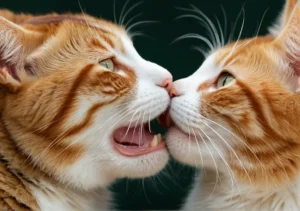Cats are known for their cleanliness, constantly grooming themselves throughout the day. So why is it that they often have a distinct smell after a bath? Let’s explore the reasons behind this phenomenon.
After a bath, cats may smell due to their skin and fur’s natural oils being disrupted, causing an imbalance that leads to an unusual scent. Other factors, such as stress or anxiety during the bathing process, can also contribute to this post-bath odor.
Understanding Cats’ Natural Oils
Cats are meticulous groomers, constantly licking themselves to spread natural oils throughout their fur. These oils act as a protective barrier, keeping their skin and coat healthy and shiny. When we give our feline friends a bath, we disturb this delicate balance by stripping away some of these oils. As a result, their skin may try to compensate by producing more oils, leading to that distinctive post-bath odor. To help maintain their natural oils, consider using cat-specific grooming products that are gentle on their skin while still getting them clean.
Stress and Anxiety Effects
Imagine being whisked away from your cozy space, dunked in water, and scrubbed vigorously – sounds stressful, right? Well, our feline companions feel the same way! The stress and anxiety of a bath can cause their bodies to release more oily secretions, contributing to that not-so-pleasant smell. To minimize this, create a calming environment by using anti-anxiety techniques like playing soft music or using pheromone sprays designed to soothe cats. Additionally, try to make bath time as quick and efficient as possible to reduce their discomfort. Remember, a less stressed cat means a happier, less smelly cat!
Proper Drying Techniques
After giving your cat a bath, the key to preventing that infamous wet fur smell is proper drying. Grab a fluffy towel and gently wrap your feline friend, patting them dry rather than rubbing. Make sure to keep them in a warm, draft-free area until completely dry. If your cat is up for it, a low setting on a blow dryer can help speed up the process. Just remember to keep the dryer at a safe distance and avoid high heat to prevent skin irritation.
Additional Unique Insight:
If your cat is particularly averse to blow dryers, consider investing in a pet-safe water-absorbing mat. These mats can help soak up excess moisture post-bath and reduce the chances of lingering odors.
Using Cat-Safe Shampoos
When washing your cat, avoid using harsh human shampoos that can strip their skin and fur of essential oils, leading to that unpleasant post-bath smell. Instead, opt for cat-specific shampoos. These gentle formulas are designed to clean without causing irritation or dryness, helping maintain your cat’s natural oils for a healthier coat.
Remember, a little goes a long way with cat shampoo – be sure to thoroughly rinse to prevent any residue that could contribute to that not-so-fresh scent. Keeping your cat’s skin and fur balanced and moisturized is key to deterring odors and ensuring a pleasant bathing experience.
For more information on feline grooming products, check out this helpful guide from American Society for the Prevention of Cruelty to Animals.
Frequency of Baths
Giving your cat too many baths can actually strip away essential oils from their skin, causing them to produce more oil to compensate, leading to that unpleasant post-bath odor. It’s recommended to bathe your cat only when necessary, such as when they’ve gotten into something dirty or sticky. For most cats, this means bathing them around once every 4-6 weeks. Remember, cats are naturally clean creatures and groom themselves regularly, so excessive bathing is often unnecessary and can do more harm than good.
Odor Elimination Tips
After giving your cat a bath, it’s common for them to emit a smell because their skin and fur are still adjusting. To help eliminate this odor, make sure to thoroughly dry your cat with a towel or a low-heat blow dryer on the cool setting, if they tolerate it. Additionally, using a pet-safe, unscented shampoo can help reduce lingering odors compared to scented varieties, which might clash with your cat’s natural scent. Another trick is to brush your cat regularly to remove dead hair and distribute natural oils, keeping their coat healthy and odor-free.
- Diet Matters: A balanced diet can contribute to your cat’s overall skin health and reduce any potential odor. Consult with your vet to ensure your cat is getting the right nutrients they need for a healthy coat.
- Bedding and Environment: Make sure your cat’s bedding is clean and regularly washed to prevent any lingering odors. Keeping their living environment fresh and odor-free can also help maintain a pleasant scent on your feline friend.
- Regular Grooming: In addition to brushing, consider using pet wipes to freshen up your cat between baths. These wipes are gentle on their skin and help remove dirt and odors, keeping your cat smelling fresh without the need for a full bath every time.
Remember, a cat’s natural scent is part of their individuality, so a slight odor post-bath might not be entirely avoidable. Embrace your cat’s unique smell and focus on their overall health and well-being rather than striving for a completely scent-free pet.
Professional Grooming Options
After giving your cat a bath, you may notice that they still have a lingering odor. Professional grooming services can be a game-changer in maintaining your cat’s hygiene and reducing post-bath smells.
One benefit of professional grooming is that groomers use high-quality shampoos and conditioners specifically designed for cats. These products can help eliminate stubborn odors that regular shampoos may not be able to tackle effectively.
Professional groomers also have the expertise and tools to ensure thorough washing and drying, which can help prevent bacteria and fungi from causing unpleasant smells on your cat’s coat. Additionally, groomers can trim your cat’s fur to reduce the risk of matting, which can trap odors.
Overall, investing in professional grooming for your cat can not only help keep them smelling fresh after a bath but also promote their overall health and well-being.
Mythbusting Common Misconceptions
It’s a common misconception that cats smell after a bath because they are reacting negatively to the water or the bathing process. In reality, the smell is often caused by residual soap or shampoo that hasn’t been rinsed completely from the cat’s fur.
Another myth is that cats groom themselves after a bath and that’s why they smell. While cats do groom themselves, this is a natural behavior that helps them maintain their coat and skin. The odor after a bath is more likely due to improper rinsing or the use of a shampoo that doesn’t agree with your cat’s skin.
To avoid post-bath smells, make sure to rinse your cat thoroughly after a bath, using lukewarm water to ensure all traces of soap are removed. Additionally, using a cat-specific shampoo that is gentle on their skin can help prevent any lingering odors.
Remember, understanding the real reasons behind why your cat smells after a bath can help you address the issue effectively and keep your feline friend clean and fresh.
Fun Fact About Cat Grooming
Did you know that cats spend up to half of their waking hours grooming themselves? That’s right! Cats are meticulous groomers, using their rough tongues to clean their fur and remove dirt. This innate grooming behavior not only helps keep their coats clean but also regulates body temperature and promotes relaxation. So, next time you see your cat grooming, you’ll know they are just practicing their natural hygiene routine!
Why Do Cats Smell After a Bath?
After bath time, you may notice that your cat has a distinctive smell that wasn’t there before. This peculiar odor is caused by a few factors. Firstly, bathing can strip away the natural oils in a cat’s skin, leading to dryness and a change in scent. Additionally, the damp fur post-bath can attract dirt and dust, contributing to the smell. Furthermore, some cats may feel stressed after a bath, releasing pheromones that can alter their typical scent. Don’t worry, though – this smell should fade as your cat’s skin and fur return to their natural state.
Tips to Reduce Post-Bath Smell:
- Be sure to thoroughly dry your cat after a bath to prevent lingering dampness.
- Consider using a gentle, cat-friendly shampoo to preserve their natural oils.
- Allow your cat time to relax and groom themselves after a bath to help restore their scent.
Alex, a passionate animal lover, has experience in training and understanding animal behavior. As a proud pet parent to two dogs and three cats, he founded AnimalReport.net to share insights from animal experts and expand his knowledge of the animal kingdom.




